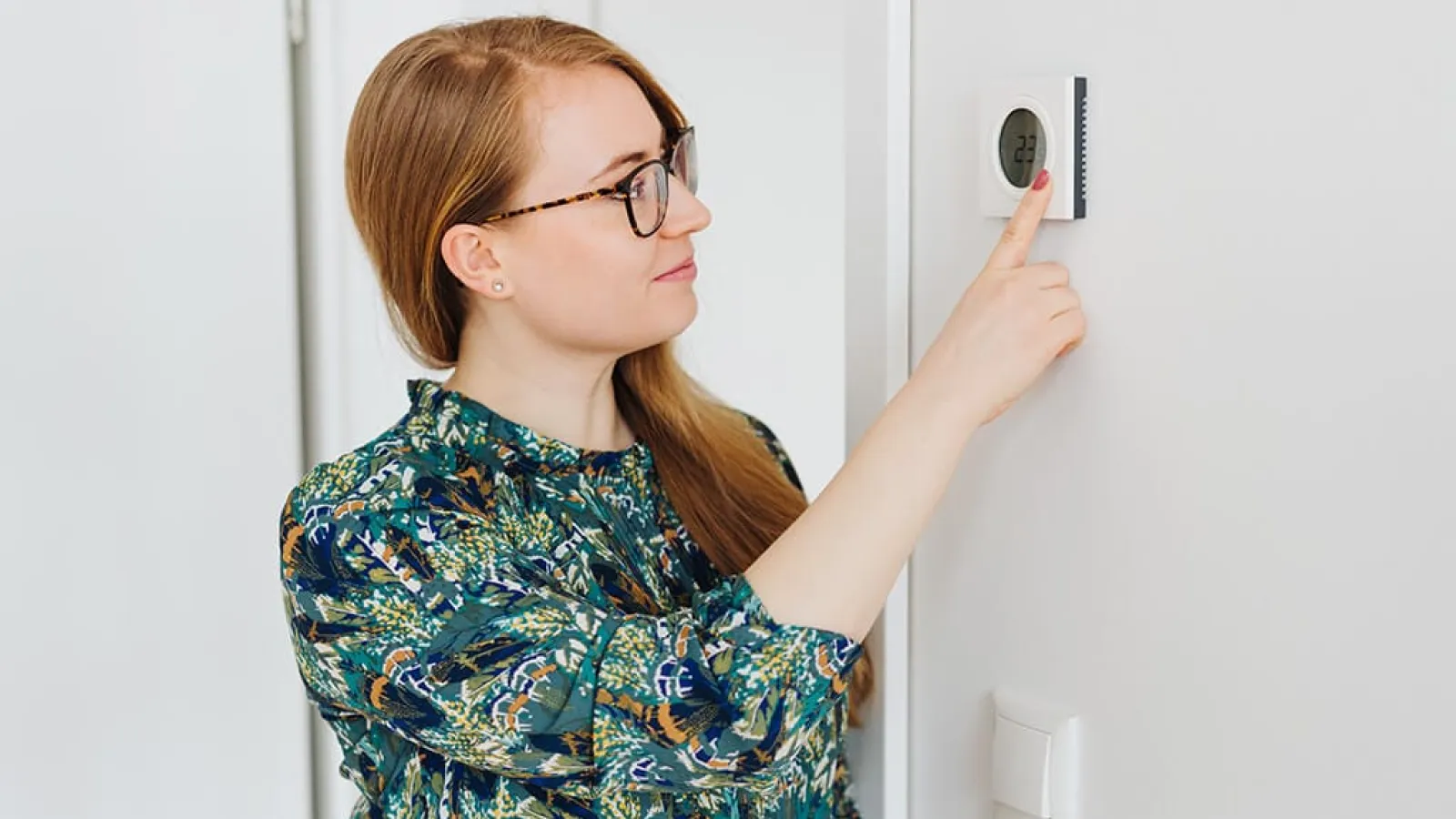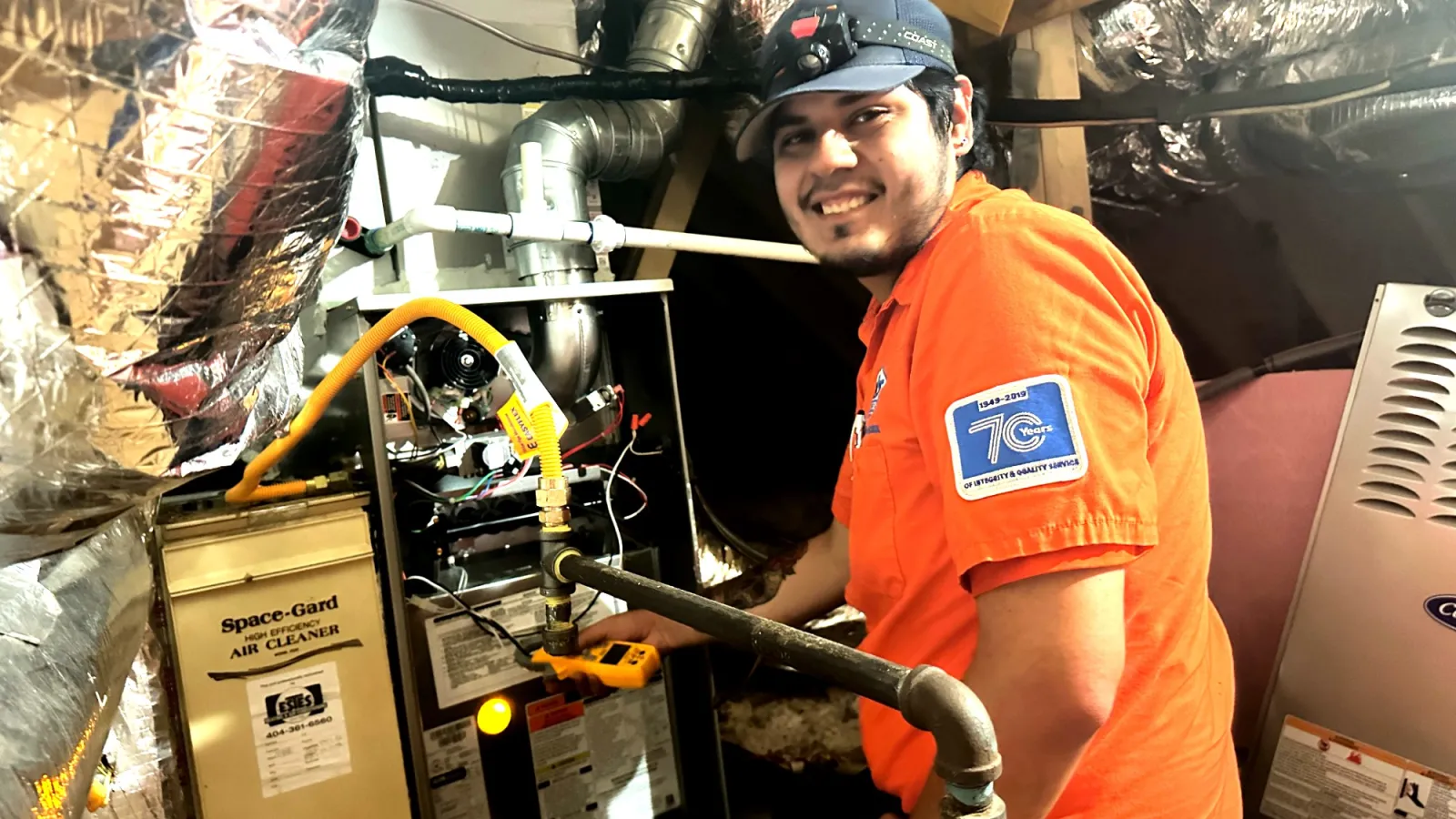Typically, furnaces in homes throughout Atlanta are very reliable. However, sometimes they act quite finicky and cease to work. What can cause a furnace to stop working? The issues range from mild and easy to solve yourself to more complicated where you need the help of a professional.
Some of the common furnace problems are listed below. Our NATE-certified heating technicians have also shared tips to try to troubleshoot these issues. Additionally, we note the issues that require professional service so you know when to call for help.
Common Reasons Your Furnace Isn’t Working
Thermostat Not Set to On
Your thermostat controls the operation of your heating system. If its settings or communications have been interrupted, this is one of the reasons your furnace might not turn on.
If your furnace stops working, check the thermostat:
- Check your thermostat settings – is it on and is HEAT mode selected? Is the set temperature a few degrees above the current room temperature to initiate a heating cycle?
- Does the thermostat need fresh batteries?
- If hardwired, has the breaker tripped?
Circuit Breaker Flipped
A flipped circuit breaker can cut power to your vital heating system components. If your furnace doesn’t come on, check the circuit breaker. Reset tripped breakers.
If the issue continues to happen, there is an underlying problem at hand that will keep occurring. Call an HVAC technician to diagnose and solve the problem.
Clogged Air Filter
A clogged air filter restricts airflow through the furnace. This leads to overheating and can cause the system to shut off because the safety switch shuts the unit down when high temperatures are reached.
Check the filter and replace it if it’s covered in debris. Give the system some time to cool down and check to see if it starts back up.
Access Panel to Furnace Not On Properly
Some furnaces have safety controls that can cause a furnace to stop working. If a furnace’s access panels are not properly attached to the unit, the furnace does not start.
Check the exterior of the furnace and verify all access panels are snug in their correct positions.
Dirt or Other Things Blocking Furnace Air Flow
Dirt, debris, furniture, rugs and other items block airflow into and through the furnace – causing overheating.
- Check the air filter and replace if dirty.
- Clear away all items stored around your furnace – keep at least 6 feet of clearance.
- Ensure all vents in your home are open and unblocked so air freely circulates.
Burners Are Not Clean
Furnace burners collect dirt and rust over time, which reduces heat output from your furnace. Clean the burners by following this process:
- Turn off electricity at the breaker box and close the gas valve leading into the furnace.
- Remove the furnace access panel to the combustion chamber, and remove the small access panel enclosing the burner chamber, if applicable.
- Remove the metal clip to detach all burners.
- With a vacuum and soft brush, clean away debris from the burner’s surface. Blow compressed air through the burner to remove interior debris, tapping and turning the burner to help detach debris.
- Replace the burners and attach clips.
- Replace access panels.
- Restore electricity and gas to the furnace.
Furnace Not Lubricated Properly
If your furnace makes grinding noises as it runs, this is a sign the bearings within its motor are not properly lubricated. Without proper lubrication, friction damages these components, which will eventually shut down your furnace.
This is an issue that is cared for during annual furnace tune ups. Turn off your furnace to avoid causing damage to the unit and keep it off until repairs are made. Call us today to schedule service, which includes lubrication for your furnace’s motor bearings.
Bad Limit Switch
The limit switch monitors temperatures within the furnace for your safety. If the switch goes bad, it can cause a furnace to stop working. This component needs to be replaced by a technician.
Faulty Igniter
If your furnace igniter is faulty, this is what can cause a furnace to stop working. Fuel will not be ignited to create heat. Check to see if the igniter needs replacement by:
- Turning off power to the furnace and removing the access panel.
- Inspecting the igniter for visible damage such as chips, cracks, warping or fraying.
- Using a multimeter at the igniter plug. If it reads zero or infinity, the igniter needs to be replaced.
Furnace Cycling Off and On
When a furnace turns on and off, this is called short cycling, which can cause damage. Short cycling is often caused by clogged filters and airflow – check and replace the filter, and ensure all vents are unblocked.
Faulty components and wrongly sized systems are also to blame for this problem. Contact your HVAC technician to assess the furnace and diagnose the cause of short cycling.
Control Board Malfunction
Malfunctions in the furnace’s control board can cause a furnace to shut down. Sudden uncomfortable temperatures are a possible sign of this problem. This issue requires a professional to fix, as knowledge of this electronic component is necessary.
Flame Sensor Needs Cleaned
The furnace’s flame sensor works with the pilot light and ignition to start burning fuel. It is a safety device that ensures a flame is available for combustion. If it is dirty, it doesn’t detect a flame, which is what can cause a furnace to stop working.
Clean the flame sensor by:
- Turning off the furnace’s electricity and gas.
- Removing the access panel.
- Removing the flame sensor and cleaning off debris with a soft cloth.
- Replacing the sensor.
- Turning electricity and gas back on then monitoring performance to see if the furnace will now work.
Gas Line Is Closed
If the gas line leading into the furnace is closed, the system receives no fuel and therefore does not heat. Check the gas valve on this line and ensure it is opened.
Heat Exchanger Is Cracked
Your furnace’s heat exchanger transfers heat from combustion to the air. Over time and years of regular use, cracks or other damage can cause your furnace to consume more energy.
Cracks allow combustion fumes to accumulate and lead to potentially dangerous carbon monoxide leaks in your home.
Due to safety risks, it’s important to have an HVAC technician out immediately to see if a heat exchanger malfunction is an issue.
Your heat exchanger is a likely culprit of your furnace problem if you notice any of the following:
- Unpleasant odor when your furnace operates.
- Surfaces in your home seem dirtier. This is a byproduct of your furnace releasing soot into the air because it’s not burning as efficiently.
To remedy the issue, call a licensed HVAC service technician. He or she will quickly determine whether the damage can be fixed or if your furnace could run more efficiently and safely with a new heat exchanger altogether.
Call Estes Services for Furnace Repair
If what can cause a furnace to stop working is not fixed by the troubleshooting steps above, or you run into an issue that requires professional help, it’s time to call Estes Services. We quickly dispatch our NATE-certified technicians to diagnose and fix your furnace issues and restore heating performance in your Atlanta home.


